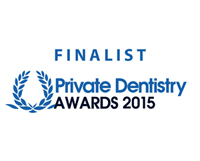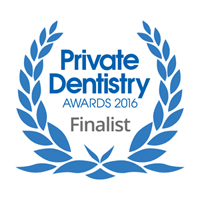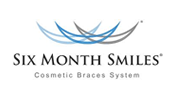
CALL NOW: 020 8673 7727
Blogs
Call to Reduce Sugar in Popular Foods
 Research clearly shows a link between poor oral health and the consumption of sugary foods. Dentists have always known and cautioned against these foods to protect oral health.
Research clearly shows a link between poor oral health and the consumption of sugary foods. Dentists have always known and cautioned against these foods to protect oral health.
Key takeaways:
- The Childhood Obesity Plan by government is a way to improve diet through phased reduction in the amount of sugar and sweetness in foods.
- Action on Sugar supports the targeted 20 percent reduction in sugar which they believe is achievable by the year 2020 if food manufacturers commit to it.
- The campaign to reduce sugar consumption in children has received widespread support from dentists; they advocate for measures that include effective public education, taxation, and changes to advertising and marketing
The BDA is supporting Action on Sugar’s call for a reduction in the shocking levels of sugar in some popular foods, many of which are aimed at children.
Read the full story here
Posted by adwords on 1st November 2016, under Oral Hygiene and Prevention
How Do You Stop Teeth Grinding?
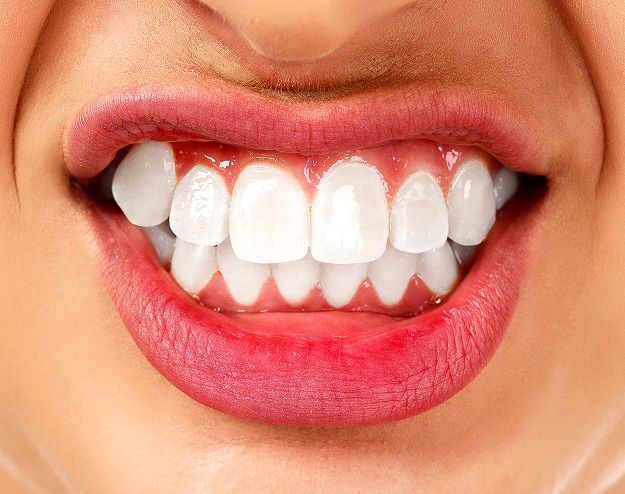 Teeth grinding intensifies on nights after you’ve been drinking alcohol. Cutting back will help stop the problem.
Teeth grinding intensifies on nights after you’ve been drinking alcohol. Cutting back will help stop the problem.
Key takeaways:
- Teeth grinding can be caused by anxiety, stress, sleep apnoea, other sleep disorders, and abnormal bite.
- A sore jaw and a dull headache upon waking may signal to the problem of teeth grinding.
- Your dentist will fit you with a mouth guard to prevent any further damage to the teeth. The underlying cause should then be addressed to finally stop the grinding.
The problem of teeth grinding is not limited to adults. Approximately 15% to 33% of children grind their teeth. Children who grind their teeth tend to do so at two peak times — when their baby teeth emerge and when their permanent teeth come in.
Read the full story here
www.webmd.com/oral-health/guide/teeth-grinding-bruxism#1
Posted by adwords on 31st October 2016, under Miscellaneous
How Your Next Teeth Cleaning Might Protect You from Pneumonia
 Bacteria in the mouth often find their way into circulation, leading to inflammation — even causing pneumonia.
Bacteria in the mouth often find their way into circulation, leading to inflammation — even causing pneumonia.
Key takeaways:
- Previous research has established a connection between pneumonia and oral health.
- Numerous microbes (bacteria, viruses) in the mouth are beneficial but in certain conditions may lead to diseases.
- Pneumonia-causing bacteria are inhaled and regular dental cleaning will help to eliminate these bacteria.
In her presentation, Dr. Doll acknowledged that people who see their dentist regularly are also likely to practice other healthy-mouth behaviors (like brushing and flossing regularly). They may also have healthier behaviors in general, which might affect their pneumonia risk, as well.
Read the full story here
http://www.health.com/oral-health/teeth-cleaning-pneumonia-risk
Posted by adwords on 31st October 2016, under Miscellaneous
Coconut Oil Will Actually Cause Buildup of Plaque
 It’s not always easy to discern what information is factual. One group set out to find out if coconut oil swilling helps in getting white teeth.
It’s not always easy to discern what information is factual. One group set out to find out if coconut oil swilling helps in getting white teeth.
Key takeaways:
- Coconut oil is thought to pull out toxins from the mouth as these particles adhere to the fat and are then spat out.
- Coconut oil was put to the test against sugar-free chewing gum to find out which of the two is the best in fighting off plaque.
- Coconut oil was found to make the teeth dirtier and caused an increase in the levels of plaque in the entire mouth.
We’re looking at a few of the ridiculous myths that are out there and trying to delve into them, and figure out what the truth is. The idea is to empower people to be a bit more knowledgeable about their own health.
Read the full story here
Posted by adwords on 29th October 2016, under Miscellaneous
Dental Detectives Study Fossil Teeth to Understand Human Diets
 Initial analysis of fossils discovered at Ol Duvai gorge in Tanzania suggested that early humans ate nuts. Recent studies using more refined technology have revealed that they had a varied diet.
Initial analysis of fossils discovered at Ol Duvai gorge in Tanzania suggested that early humans ate nuts. Recent studies using more refined technology have revealed that they had a varied diet.
Key takeaways:
- Teeth are preserved very well when fossilized and hold lots of information in the form of isotopes. Newer and more advanced techniques have helped to study teeth.
- Thick enamel on the molars indicates that they were used for crushing foods such as grinding seeds or crushing the marrow out of bones.
- Dental microwear refers to the marks left behind by food on teeth that result from food particles being dragged across and pressed into our teeth.
Teeth from more recent fossils reveal more because they have more isotopes preserved in them. For example, the nitrogen in the teeth of Neanderthals can reveal whether the protein they ate came from plants or animals.
Read the full story here
Posted by adwords on 28th October 2016, under Miscellaneous
The Best and Worst Seasonal Foods for Your Teeth
 We are easing into the major holidays and people tend to indulge in alcohol. Alcohol isn’t good for the mouth and teeth since it dries out the mouth.
We are easing into the major holidays and people tend to indulge in alcohol. Alcohol isn’t good for the mouth and teeth since it dries out the mouth.
Key takeaways:
· Spinach, kale and other green vegetables are good for healthy teeth. They require more chewing which helps to release more saliva that washes the teeth.
· Avoid too much citrus foods such as oranges, lemons, and lime that are highly acidic and cause erosion of tooth enamel. Citrus fruits can be enjoyed with large meals to limit damage to the teeth.
· Candy should be avoided due to the high sugar content that fuels bacterial activity in the mouth.
In general, you don’t need to deprive yourself of your favorite fall and winter treats to maintain a healthy mouth — just be sensible. “You can eat anything in moderation,” says Dr. Messina. “And make sure you brush twice a day, floss once a day, and see your dentist regularly.”
Read the full story here
www.everydayhealth.com/hs/dental-health/fall-winter-seasonal-foods-pictures/
Posted by adwords on 27th October 2016, under Miscellaneous
Stress Has Far Reaching Effects on Oral Health
 People suffering from stress are prone to poor eating habits that will increase the risk of tooth decay and other adverse health outcomes.
People suffering from stress are prone to poor eating habits that will increase the risk of tooth decay and other adverse health outcomes.
Key takeaways:
- Foul mood caused by stress may cause people to skip routine oral healthcare tasks such as brushing and flossing. Stress also causes poor eating habits that lead to poor oral health.
- Stress causes cold sores and mouth ulcers since it leads to compromised immunity.
- Teeth grinding is linked with stress and causes damage to teeth.
Stress can lead to depression, and depressed patients, according to research, have twice the risk of an unfavorable outcome from gum disease treatment compared to those who are not depressed.
Read the full story here
www.webmd.boots.com/oral-health/guide/how-stress-affects-your-oral-health
Posted by adwords on 26th October 2016, under Oral Hygiene and Prevention
Very high success rate with dental implants
 Dental implants have become a favored option for tooth replacement with success rates close to 98%. That’s excellent news for you.
Dental implants have become a favored option for tooth replacement with success rates close to 98%. That’s excellent news for you.
Key takeaways:
- Dental implants are the next best thing to having your own teeth, as they look and feel natural.
- Implants can replace a single tooth, several teeth or all your teeth.
- A dental implant can make dentures more secure, so they are like your natural teeth.
The dental implant, typically made of titanium, serves as the replacement for the tooth root – the very foundation of a natural tooth. Because it is placed in the jawbone and fuses with your natural bone, the dental implant forms a sturdy base for your replacement teeth.
Read more:
Posted by adwords on 26th October 2016, under Miscellaneous
Brushing Teeth May Shield Against Heart Disease
 Maintenance of good oral health is important for your overall health. Everyday habits such as brushing teeth will impact on your cardiovascular health positively.
Maintenance of good oral health is important for your overall health. Everyday habits such as brushing teeth will impact on your cardiovascular health positively.
Key takeaways:
- New research indicates that thoroughly brushing the teeth to remove plaque will reduce inflammation in the body in effect preventing stroke and heart attacks.
- Periodontal disease is closely associated with coronary heart disease. It also shares a number of risk factors with cardiovascular diseases and chronic diseases.
- The benefits of brushing extend to inflammatory diseases and conditions such as arthritis, diabetes and Crohn’s disease.
President of the Irish Dental Association, Dr PJ Byrne, said that improving oral hygiene by better, more efficient brushing and cleaning between the teeth is likely to have a systemic health benefit.
Read the full story here
Posted by adwords on 25th October 2016, under Miscellaneous
Useful Oral Health Facts and Tips for Halloween
 Limiting the number of houses visited by your children on Halloween may help safeguard oral health. Halloween should not be a time when children expose their teeth to harmful substances.
Limiting the number of houses visited by your children on Halloween may help safeguard oral health. Halloween should not be a time when children expose their teeth to harmful substances.
Key takeaways:
- Have alkaline foods such as milk and cheese on Halloween night to help neutralize the buildup of acid in the mouth.
- Parents should stop their children from eating sweets and chocolates at least one hour before bedtime on Halloween.
- Children should be supervised when brushing their teeth before they finally retire for bed on Halloween.
It is not the amount of sweets consumed that cause tooth decay – it is how often they are eaten. Sugar causes the bacteria in plaque to produce acids. It is these acids which attack children’s tooth enamel and cause tooth decay.
Read the full story here
http://www.dentistry.co.uk/2011/10/27/oral-facts-and-tips-healthier-halloween/
Posted by adwords on 24th October 2016, under Miscellaneous
Dental Sealants Prevent Cavities, CDC Vital Signs Reports
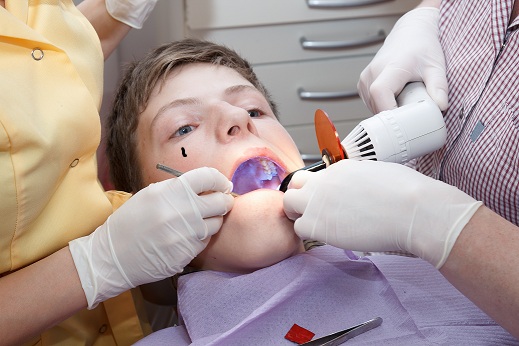 Even though teeth cavities are quite common in children, they can be prevented. The use of dental sealants will help protect teeth from cavities.
Even though teeth cavities are quite common in children, they can be prevented. The use of dental sealants will help protect teeth from cavities.
Key takeaways:
· Dental sealants are highly effective in preventing cavities in the permanent back teeth of children.
· Children from low-income families are at high risk of teeth cavities but are less likely to have dental sealants compared to those from higher income families.
· Providing dental sealants through school-based programs to the low-income children has been projected to save up to $300 million in dental treatment costs.
State officials play an important role in increasing children’s access to school-based dental sealant programs (SPSP) in their states. Officials can target school-based sealant programs to the areas of greatest need in their state.
Read the full story here
https://www.cdc.gov/media/dpk/other/dental-sealants/vs-dental-sealants.html
Posted by adwords on 24th October 2016, under Miscellaneous
Reasons Why Teeth Hurt
 A cracked tooth is the cause of much trouble due to pain and sensitivity. A crack in teeth in the back of the mouth is not always visible but may cause great discomfort.
A cracked tooth is the cause of much trouble due to pain and sensitivity. A crack in teeth in the back of the mouth is not always visible but may cause great discomfort.
Key takeaways:
- Brushing aggressively may lead to gum recession that exposes the root of the tooth.
- Periodontal disease is caused by the accumulation of bacteria in the gum and may cause pain.
- Teeth grinding or clenching in your sleep will cause wearing of tooth enamel and even fractured teeth.
Especially during allergy and flu season, a sinus infection may creep up in a way that doesn’t even feel like a normal one. “Since the roots of certain teeth actually sit right by the sinuses, the pressure from a sinus infection actually mirrors tooth pain,” says Handschuh.
Read the full story here
http://www.prevention.com/health/7-reasons-why-your-teeth-hurt
Posted by adwords on 21st October 2016, under Miscellaneous
Finally! A solution for your bad teeth
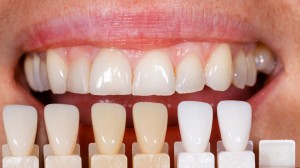 Have you got a crooked or chipped tooth, maybe upper teeth that are a bit too long? These are problems people put up with. Your dentist has a little magic that can help. Dental veneers can give you the great smile you’ve wanted.
Have you got a crooked or chipped tooth, maybe upper teeth that are a bit too long? These are problems people put up with. Your dentist has a little magic that can help. Dental veneers can give you the great smile you’ve wanted.
- Veneers are ultra-thin, custom-made shells shaped like your teeth. We create them from porcelain or a resin composite.
- These very thin shells will be bonded to the front of your teeth.
- Veneers can change the colour, shape, and size of a tooth – improving appearance greatly.
With veneers, you can get a quick smile makeover that lasts a long time. Patients walk away smiling at the difference. Everyone loves having a better-looking smile. Especially if you’ve put up with bad teeth for awhile. Right?
READ MORE:
http://www.webmd.com/oral-health/guide/veneers#1-2
Posted by adwords on 21st October 2016, under Miscellaneous
What to Expect When You’re Pregnant
What to Expect from Your Oral Health When You’re Expecting
 When you are pregnant, your body’s ability to fight off the bacteria that causes gingivitis is reduced because your body is concentrating on your baby. So you are more likely experience bleeding gums
When you are pregnant, your body’s ability to fight off the bacteria that causes gingivitis is reduced because your body is concentrating on your baby. So you are more likely experience bleeding gums
1. The first and last half of the third trimester is very important for development, and it is recommended to avoid any dental treatment such as radiographs and fillings during this stage. The second trimester is ideal to carry elective dental treatment, but invasive treatment is recommended after the pregnancy.
2. Ensure that you do not skip your check up and hygiene appointment. At this stage, you are more prone to dental disease and it is important for your dentist and hygienist to monitor your teeth and gums.
3. It is very important to keep up with your oral hygiene habits. Did you know that brushing your teeth will only clean about 1/3rd of your total tooth surfaces? Flossing will increase that to over 2/3rd of your total teeth surfaces clean.
4. It is important to update your dentist with any medication and multi vitamins that you are taking.
5. Corroborate with your doctor for a healthy balanced diet to ensure proper nutrition for you and your baby.
Posted by Indigo Little on 2nd April 2015, under Pregnancy
Just How Effective is Oil Pulling?
There’s been a popular debate on the effects of oil pulling on overall oral health. With more individuals favouring a more holistic approach for health, oil pulling seems like an ideal method to reduce overall bacteria count naturally in the mouth thus, resulting in a healthier oral health.
Oil pulling is swishing the mouth for 20 minutes with coconut oil, and then spitting the solution out. It is not effective if not done for at least 10-20 minutes, since it takes time for the oil to “pull” the bacteria from the mouth.
Not enough studies are done to prove the effectiveness of oil pulling, but most individuals claim their mouth feels healthier.
So what are the possible effects of oil pulling?
- Whiter Smile
- Healthier gums
- Reduces bad breath
For individuals motivated enough to attempt, this seems like a low-risk, holistic method to improve their oral health. However, brushing and flossing still needs to be part of the daily routine.
Posted by Indigo Little on 13th January 2015, under Miscellaneous
Indigo Little Treatment Coordinator
This month, we ha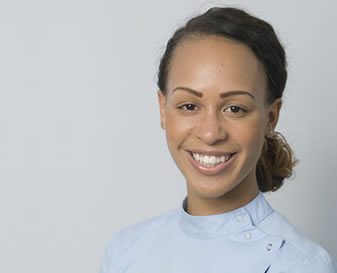 ve introduced a new service to assist our members in making decisions about treatment plans and to walk them through the patient journey.
ve introduced a new service to assist our members in making decisions about treatment plans and to walk them through the patient journey.
We are now offering treatment coordinator services run by Laura Scougall. She will be available to all existing members of the practice as well as new patients who have questions about the treatments offered by Indigo Little. Appointments are a held in a private room, which allows you to discuss any concerns that you may have in a non-clinical, comfortable setting. Once you have had an initial meeting with Laura, she will also be available throughout your treatment to help guide and assist in any way.
The role of the treatment coordinator is to;
-Discuss the full range of treatment available at Indigo Little
-Hold a private conversation to discuss any concerns or questions
-Discuss finances and payment options
-Available for questions over the phone and e-mail at any time
-One point of contact throughout the patient journey
If you are interested in arranging a time to speak to our treatment coordinator about an existing treatment plan or new treatment that you are considering, you can do so by calling us on 0208 673 7727 or emailing her on laura@indigolittle.com
Posted by Indigo Little on 10th December 2014, under Practice Blog
Mouth Cancer Action Month
 This November is Mouth Cancer Action Month, a charity campaign run by the British Dental Health Foundation to raise awareness of mouth cancer. It aims to increase education of the risk factors, signs, symptoms, and to encourage everyone to discuss these with their dental professional.
This November is Mouth Cancer Action Month, a charity campaign run by the British Dental Health Foundation to raise awareness of mouth cancer. It aims to increase education of the risk factors, signs, symptoms, and to encourage everyone to discuss these with their dental professional.
In the UK, more than 6,700 people were diagnosed with mouth cancer last year and it is one of the very few cancers which are predicted to increase in the coming years. This makes education, early detection and prevention vital. The campaign encourages everyone to know what to look for and most importantly, to take action. Anyone can be affected by mouth cancer; however they are most common in people aged over 40, particularly men. It is still very important for people of all ages to be aware of the risk factors. Most cases are linked to the use of tobacco (smoking, chewing, or passive), and alcohol. When consumed together or in excess, the risk is even greater. Recent reports have also shown that oral cancer is linked to the human papillomavirus (HPV) which can be spread through unprotected oral sex. The HPV virus is also strongly linked with cervical cancer.
Mouth cancer can most often be spotted early by your dentist at your routine dental check-up. If the dentist finds anything unusual, they are then able to refer you to a consultant to carry out a thorough examination of the mouth and throat. It is important to visit your dentist regularly so that they can monitor the health of your mouth and spot any abnormalities.
At Indigo Little we make this an important part of our routine check-up and actively try to educate our patients on the risks of mouth cancer. Do your part by making sure you come in to visit your dentist regularly and encouraging all of your family and friends to do so as well.
If you would like to get involved in the campaign or find out more, you can visit their website on www.mouthcancer.org
Posted by Indigo Little on 21st November 2014, under Mouth Cancer
The Indigo Little Check-Up
 As winter approaches we are encouraging all of our patients to come in for their routine check-ups before they take off for the holidays. Having your check-up could put your mind at rest that you won’t be running into any unexpected tooth ache at your Christmas dinners or New Years Eve parties.
As winter approaches we are encouraging all of our patients to come in for their routine check-ups before they take off for the holidays. Having your check-up could put your mind at rest that you won’t be running into any unexpected tooth ache at your Christmas dinners or New Years Eve parties.
Preventative care is at the heart of all dental care at Indigo Little and why we recommend that all of our patients come in for their check-up every six months. This way, we can monitor for any problems and catch them before extensive treatment is necessary. To help all of our members understand the value of the Indigo Little check-up, we thought we should write up a guide of what the dentist looks for during your appointment. The Indigo Little Dental check-up is a one hour appointment with Dr. Little, the head dentist, and covers ten key points in assessing your dental health.
- Updating your personal and medical history
- Discuss how you feel about your oral health and any concerns you may have
- Checking the jaw and the jaw joint for evidence of wear and damage
- Assessing lymph nodes in the neck to see if there are any swellings due to oral infections
- Examining external tissues of the mouth
- Examining all internal oral tissue (palette, tongue, cheeks)
- Checking for oral cancer
- Checking the alignment of your teeth
- Assess the health of gums, any recession or pocketing around the teeth
- Checking the teeth for decay, fractures and wear. We also check all existing dental work (fillings, implants, etc.) to ensure that all is as it should be
- Checking for evidence of tooth grinding (bruxism), as well as acid erosion
- If needed, taking photographs or X-Rays, which are kept on record
- Discussing findings and treatment plan options in detail
- Finally, Dr. Little will develop a personalised treatment plan based on findings and your preferences
For all lengthy or complex treatment, Dr. Little writes to you with a explaining your treatment plan. We then call you to follow up if you have any questions. All of your dental records are kept so that we can monitor your dental health and be able to advise you best on how to maintain it.
If you would like to book in your check-up before the Christmas break closes in, you can make an appointment through our webpage or call us on 0208 673 7727.
Posted by Indigo Little on 13th November 2014, under Practice Blog
The 6 Month Smiles Journey
Our Dental Nur se, Laura Scougall, had her 6 Month Smiles invisible braces put on one month ago and the progress we’ve seen in that time has been huge! We asked her to write about her experience so here is her first entry, to be followed by more along the way.
se, Laura Scougall, had her 6 Month Smiles invisible braces put on one month ago and the progress we’ve seen in that time has been huge! We asked her to write about her experience so here is her first entry, to be followed by more along the way.
Like a lot of people, I had Orthodontic treatment as a teenager but made the mistake of not wearing my retainer after my braces were removed. Of course my teeth started to move, slowly but surely, back into their original position, undoing all the hard work in the past two years!
I knew that I wanted to get my teeth straightened again at some point but the amount of time I had to wear yet another brace was a major factor that went into my decision on the type of brace to go for. There are so many options available for adults now such as Invisalign or The Inman Aligner, to name just a few.
Dr . Little introduced me to 6 Month Smiles and the name alone sparked my interest. They literally do as they say: the average time a patient will wear them is just six months. Although it is a permanent appliance, it is tooth coloured and I find that most people don’t even notice that I am wearing them until I mention it.
Initially I found them quite uncomfortable and restrictive in terms of what I could eat. No nuts, juicy steaks, red wine or coffee! This is because these types of food and drink can pull brackets off delaying your progress and stain the tooth coloured bands. However, because the treatment is not long term, it is worth making a few adjustments to your daily life for a short period of time. To get through the beginning I kept reminding myself of the straight smile I would soon have and now the changes don’t affect me at all. Plus, when you are wearing something so discreet, you wouldn’t want to attract attention to them because of staining!
After a fortnight of wear I no longer felt any discomfort and the position of my teeth have already improved. I have been wearing them for just over a month now and to say I am pleased with the results would be an understatement, the changes have happened so quickly and I still have a few months left to go!
Laura
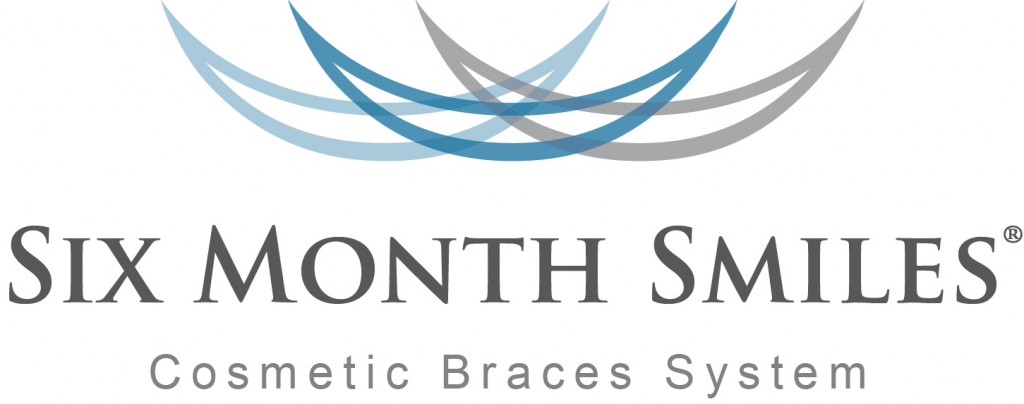
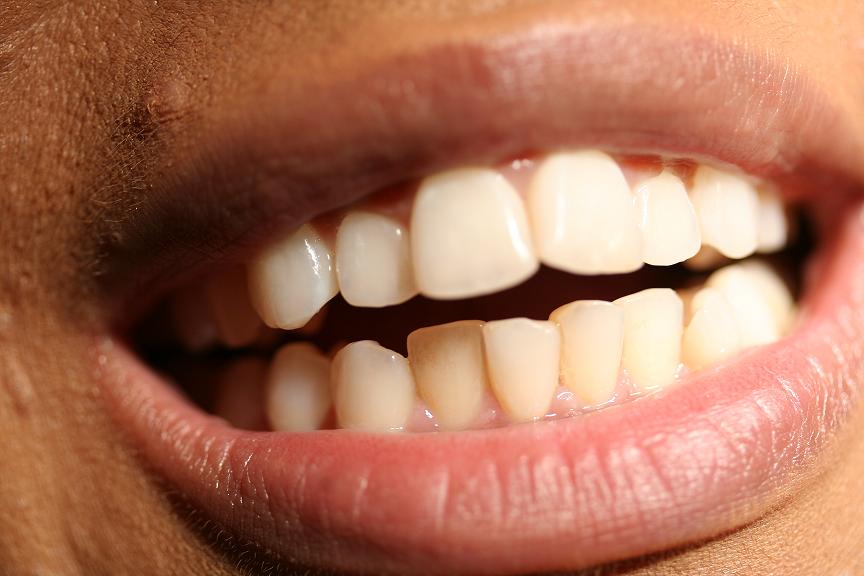
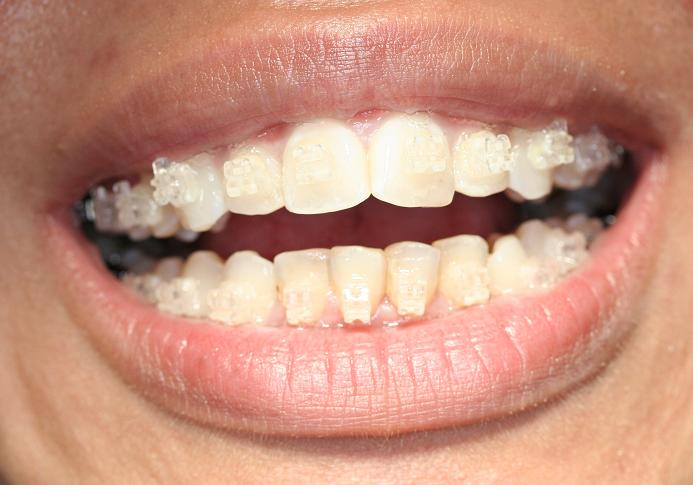
Posted by Indigo Little on 17th October 2014, under Six Month Smiles
“A brief guide to Gum Disease and it’s treatment” by Dr Federico Moreno
Hello!
I am Dr Federico Moreno and from now on I will be part of the team at Indigo Little. Originally from Spain, I came to England back in 2009 looking for a bit of sunshine! Two years ago I decided to embark in training in Periodontology (the science that deals with the problems of the bone and gums surrounding your teeth) at the world renowned UCL Eastman Dental Institute and this why I now only work providing treatment for gum disease, aesthetic gum problems and dental implants.
In this letter I will try to give you some information on what gum disease is and how we can tackle it. Your gums need to be healthy for you to maintain your teeth for your lifetime and will also help you achieve the perfect smile. But healthy gums are not just important for your oral health. Maintaining healthy gums can also be important for your overall health. Research suggests an association with advanced gum disease and other chronic health conditions such as diabetes and heart disease. The European Federation of Periodontology has recently launched an awareness campaign on this, titled Perio and General Health. The Vital Connections. It aims to help everyone understand the importance of healthy gums for your whole body.
Gingivitis and Periodontitis: the Basics
The bacteria which live in our mouths create a sticky film on teeth (plaque). Brushing and flossing help to remove plaque. When plaque is not removed, it hardens over time to form calculus which cannot be removed by brushing. Only a professional cleaning by a dentist or dental hygienist can remove calculus (tartar).
The plaque on your teeth will cause inflammation of the gums which is what we know as gingivitis. Most of the population show some degree of gingivitis which is easily spotted in gums that look shiny, red, swollen and bleeding when brushing, or even spontaneously. People with gingivitis have not lost any bone around the roots of the teeth (which is what holds the teeth in place!).
The good news is that gingivitis is completely reversible and, for most of us, the gums will go back to normal within a week of a cleaning from your dentist and a week of proper brushing and flossing. Regular check-ups and cleanings as well as good oral hygiene are the best way to prevent gingivitis from happening in the first case.
If not treated, gingivitis can advance to periodontitis, when you start losing the supporting bone of the teeth. Deep pockets form between the gums and your teeth, hiding the bacteria deep inside the gums and outside of the reach of your floss and toothbrush. If not treated, the teeth will eventually become loose and exfoliate themselves. The teeth may eventually fall out or need to be removed.
Not everyone develops periodontitis but research has shown that it affects almost half of the population in the UK. To develop periodontitis, you have to be susceptible to the disease. There is a genetic component which makes your body react aggressively against plaque. In addition, your lifestyle may also make you more prone to have periodontitis. Smoking and systemic diseases such as diabetes will put you at a higher risk of gum problems and will also make the treatment less effective.
Treatment
Firstly, prevention should always be our main priority. By brushing your teeth for 2-3 minutes, twice a day, with fluoride toothpaste, and by flossing on a daily basis, you will significantly decrease your chances of developing gum problems. Also, try to keep a healthy balanced lifestyle and don’t smoke!
Our team of dentists and hygienists at Indigo Little will clean your teeth meticulously to remove the plaque and calculus above and below the gum line. With more advanced periodontal care we remove the pockets of bacteria, using local anaesthetic. This may take a number of visits. You will also be given instructions on how to remove the plaque successfully, yourself, at home on a daily basis which is probably the most important part of this initial treatment.
After allowing some time for the healing of the gums, the condition of your mouth will be reassessed and you may be advised to have some more advanced treatment such as minor gum surgery to completely eliminate the pockets or even try to grow the bone back in some specific cases.
Periodontal disease is never cured, but it can be controlled as long as you maintain good care at home and attend your periodontist/hygienist regularly (in accordance with your needs). Regular appointments are the key to keeping your teeth healthy for life, as it will allow our team to catch any recurrent problems in advance and keep your smile in great shape!
We hope to see you soon at Indigo Little!
Dr Federico Moreno
Posted by Indigo Little on 2nd October 2014, under Practice Blog

